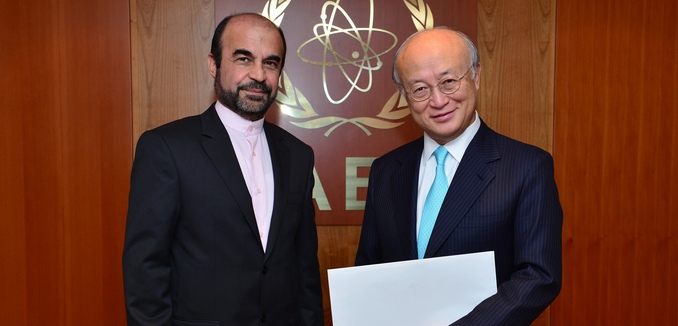Iran’s envoy to the International Atomic Energy Agency (IAEA) said that Iran would not commit to the transparency measures insisted on by the United States until they “see the final text,” Reuters reported today.
The United States urged Iran to implement the so-called Additional Protocol, which allows more intrusive access to Iranian sites, and Code 3.1, which requires from Iran early notification of the construction of any new nuclear facilities.
“These are the issues still under discussion and I believe we should wait to see the final text… and before that, we cannot prejudge anything,” [envoy] Reza Najafi told reporters.
Code 3.1, Reuters reports, “requires from Iran early notification of the construction of any new nuclear facilities.” The Additional Protocol would allow inspectors access to suspected nuclear sites with as little as two hours notice, as well as the ability to take soil samples to detect past nuclear activity.
Najafi also rejected cooperating with the IAEA on assessing the possible military dimensions (PMD) of Iran’s nuclear program. Iran claims that existing documentation on its PMD is forged.
“We can discuss new practical measures provided that the inauthentic documents and information would be put aside,” Najafi said. The IAEA has said it carefully reviews information provided for its investigations and takes nothing at face value.
Despite refusing to commit to essential conditions that would make Iran’s commitment to a nuclear agreement verifiable, Najafi believes that “reaching an agreement by the end of June is achievable,” referring to the June 30 deadline of the ongoing talks.
Najafi’s comments potentially put Iran in conflict with the European Union, which insists that no deal can be reached with Iran unless it satisfactorily answers all outstanding questions about the PMD of its nuclear research.
Najafi isn’t the only Iranian official who has objected to measures that would make Iranian compliance with a potential nuclear deal verifiable. Supreme Leader Ayatollah Ali Khamenei and Defense Minister Hossein Dehghan have both ruled out inspections of military sites. Foreign Minister and chief nuclear negotiator Mohammad Javad Zarif accused the West of making “excessive” demands in the nuclear talks. Hamid Ba’eedinejad, an Iranian nuclear negotiator, claimed that inspections of military sites have never been discussed as part of the ongoing nuclear negotiations between Iran and the P5+1 nations.
[Photo: IAEA Imagebank / Flickr ]




